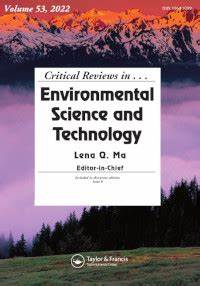A paradigm shift driven by multi-source data, mechanistic insights, adaptive machine intelligence, and multi-objective optimization for composting intelligent automation applications
IF 13.2
1区 环境科学与生态学
Q1 ENVIRONMENTAL SCIENCES
Critical Reviews in Environmental Science and Technology
Pub Date : 2025-10-18
DOI:10.1080/10643389.2025.2557306
引用次数: 0
Abstract
Driven by the dual carbon goals, composting technology is undergoing a transformative shift toward multifunctionality, precision, and intelligentization. By leveraging the data-driven modeling advantages of machine learning (ML), composting technology aims to enhance organic waste valorization and soil carbon sequestration. However, current intelligent composting technologies remain constrained by data scarcity, limited generalization capacity, and oversimplified optimization objectives, which hinder their ability to meet the demands of high-efficiency resource recovery and process intelligence. To address these challenges, this study proposes a quadruple synergistic modeling framework, integrating “multi-source data, mechanistic insights, adaptive intelligence, and multi-objective optimization,” aiming to overcome the limitations of traditional data analysis methods and drive composting technologies toward intelligence and high-value applications. Specifically, this study enhances the prediction accuracy through multi-source data integration, elucidates the interaction mechanisms within the system to strengthen the model construction, incorporates dynamic data optimization modules to improve the system adaptability, and couples a multi-objective optimization decision system to holistically regulate the multi-dimensional balance among compost product value, process efficiency, and environmental benefits. Overall, this study conceptualizes a sustainable organic waste management paradigm, offering novel perspectives to advance waste valorization cycles and amplify the carbon mitigation potential of composting, thereby contributing to the implementation of dual carbon goal strategies.由多源数据、机械洞察、自适应机器智能和堆肥智能自动化应用的多目标优化驱动的范式转变
在双碳目标的推动下,堆肥技术正经历着向多功能、精准化和智能化的变革。通过利用机器学习(ML)的数据驱动建模优势,堆肥技术旨在增强有机废物的增值和土壤碳固存。然而,目前的智能堆肥技术还存在数据稀缺、泛化能力有限、优化目标过于简化等问题,难以满足资源高效回收和过程智能化的要求。为了应对这些挑战,本研究提出了一个“多源数据、机制洞察、自适应智能和多目标优化”的四重协同建模框架,旨在克服传统数据分析方法的局限性,推动堆肥技术走向智能化和高价值应用。具体而言,通过多源数据集成提高预测精度,阐明系统内部交互机制,加强模型构建,引入动态数据优化模块,提高系统适应性,耦合多目标优化决策系统,整体调节堆肥产品价值、工艺效率和环境效益的多维平衡。总体而言,本研究概念化了可持续有机废物管理范式,为推进废物增值周期和扩大堆肥的碳减排潜力提供了新的视角,从而有助于实施双碳目标战略。
本文章由计算机程序翻译,如有差异,请以英文原文为准。
求助全文
约1分钟内获得全文
求助全文
来源期刊
CiteScore
27.30
自引率
1.60%
发文量
64
审稿时长
2 months
期刊介绍:
Two of the most pressing global challenges of our era involve understanding and addressing the multitude of environmental problems we face. In order to tackle them effectively, it is essential to devise logical strategies and methods for their control. Critical Reviews in Environmental Science and Technology serves as a valuable international platform for the comprehensive assessment of current knowledge across a wide range of environmental science topics.
Environmental science is a field that encompasses the intricate and fluid interactions between various scientific disciplines. These include earth and agricultural sciences, chemistry, biology, medicine, and engineering. Furthermore, new disciplines such as environmental toxicology and risk assessment have emerged in response to the increasing complexity of environmental challenges.
The purpose of Critical Reviews in Environmental Science and Technology is to provide a space for critical analysis and evaluation of existing knowledge in environmental science. By doing so, it encourages the advancement of our understanding and the development of effective solutions. This journal plays a crucial role in fostering international cooperation and collaboration in addressing the pressing environmental issues of our time.

 求助内容:
求助内容: 应助结果提醒方式:
应助结果提醒方式:


